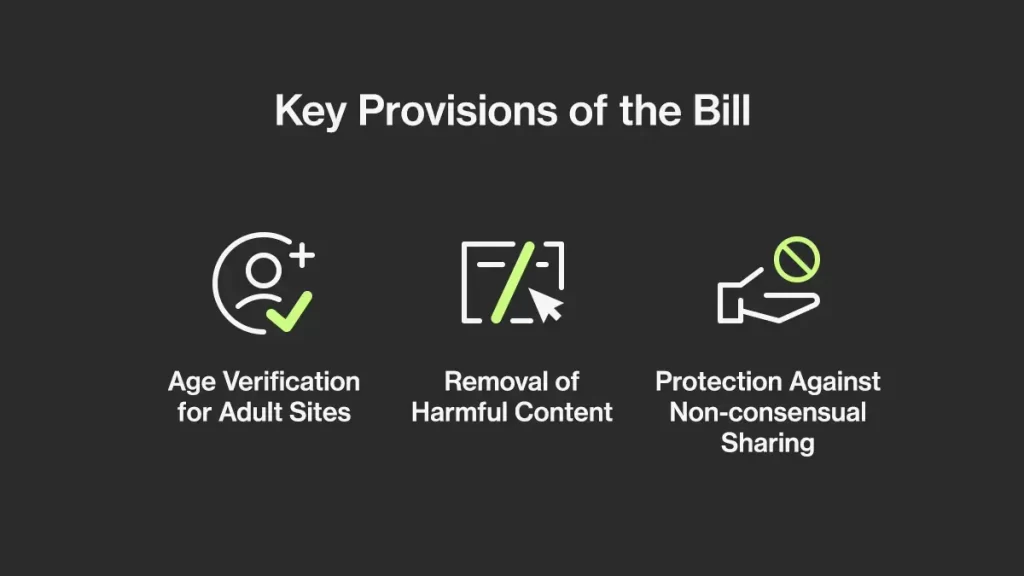The United Kingdom has taken a significant step in safeguarding minors online with the introduction of the Online Safety Bill, a landmark piece of legislation aimed at creating a safer internet for young users with the aim to restrict access to certain content. However, as with any substantial policy change, this bill brings with it a mix of support, concern, and controversy.
The Core of the Online Safety Bill
The United Kingdom introduced its Online Safety Bill in 2023, mandating companies to enforce age restrictions and verification measures, including biometric technology, to protect children from legal but harmful content.
The Bill was designed to impose strict age verification measures across various online platforms. The primary objective is to prevent minors from accessing inappropriate content, including pornography and other potentially illegal content. This law mandates that companies implement robust age-checking measures, which can include advanced biometric technology, to verify users’ ages accurately.
What does the Online Safety Bill Aim to Achieve?
Under this law, adult content websites and other regulated services must verify UK users’ ages to prevent minors from accessing explicit content. Platforms are also required to remove illegal content, such as child sexual exploitation and abuse, animal cruelty, illegal drug and weapon sales, and posts promoting suicide, self-harm, illegal immigration, and terrorism to keep young people safe online. This would also require tech companies to publish risk assessments. Registered adult users should also be offered tools that help flag and block certain content.
Companies must adhere to a comprehensive list of new regulations or face fines up to £18 million or 10 percent of their annual global turnover. In some cases, company executives could face imprisonment.
Additionally, the Bill will hold social media companies legally accountable for ensuring the safety of children and young people online. It will:
- Require platforms to swiftly remove illegal content or prevent it from appearing, including content promoting self-harm.
- Prevent children from accessing harmful and age-inappropriate content.
- Enforce age limits and implement age verification measures.
- Increase transparency about the risks and dangers children face on major social media platforms by publishing risk assessments.
- Provide parents and children with clear, accessible methods to report online issues when they occur.
Key Provisions of the Bill:

- Age Verification for Adult Sites: These sites are now legally required to ensure that minors cannot access their content. This involves rigorous age-checking mechanisms to confirm that users are of legal age.
- Removal of Harmful Content: Platforms must remove both illegal and legal but potentially damaging content. This encompasses a wide range of materials, from child sexual abuse and animal cruelty to posts promoting suicide, self-harm, illegal immigration, and terrorism.
- Protection Against Non-consensual Sharing: The law simplifies the process of prosecuting individuals who share intimate images or deepfakes without consent, providing a stronger legal framework to combat online abuse.
Enforcement and Penalties
Enforcement of the Bill falls under the purview of Ofcom, the UK’s communications regulator. Ofcom is tasked with developing and issuing codes of conduct for companies to follow. The first draft of these guidelines is anticipated to be released on November 9, according to the BBC.
Companies that fail to comply with the new regulations face severe penalties. These include fines of up to £18 million (US$22.3 million) or 10 percent of their annual global turnover. In extreme cases, non-compliance could result in prison sentences for company executives, emphasizing the government’s commitment to ensuring adherence.
Age Verification Methods
ID-based Age Verification: This method involves steps similar to identity verification. Users must provide their identity document and a photo of themselves for biometric comparison, ensuring secure verification. With Ondato’s age verification system, this process is straightforward, takes less than 60 seconds, and has zero tolerance for fraud.
Age Estimation: Age estimation tools reduce the need for identity documents by using biometric data to categorize users into age groups. Ondato’s system can onboard most users without additional documents, only requesting IDs if there are doubts.

Support and Opposition
The Bill has received robust support from child safety advocates. Organizations such as the National Society for the Prevention of Cruelty to Children (NSPCC) and the Equality and Human Rights Commission (EHRC) have hailed the Bill as a necessary measure to protect vulnerable young users from the myriad dangers of the internet.
However, the Bill has also sparked significant debate among technology experts and privacy advocates. Some of the concerns raised by critics argue that the stringent age verification measures and content removal requirements could infringe on privacy and free speech. There are concerns about the potential for misuse of biometric data and the broader implications of such invasive verification processes. On top of this, many tech companies, especially those providing user to user services, argue that the Bill makes them unfairly liable for the content on their sites.
Striking a Balance
The introduction of the Online Safety Bill represents a critical moment in the ongoing effort to create a safer online environment for children. While the Bill aims to address genuine and pressing concerns, it also raises important questions about privacy, data security, and the limits of government regulation.
As the UK moves forward with implementing this legislation, finding a balance between protecting young internet users and preserving the fundamental rights of privacy and free expression will be paramount. Continuous dialogue between policymakers, technology companies, and civil society will be essential to ensure that the Online Safety Bill achieves its intended goals without unintended consequences.
In the end, the success of the Bill will depend on its ability to adapt to the rapidly evolving digital landscape while maintaining a steadfast commitment to the safety and well-being of children in the UK.



